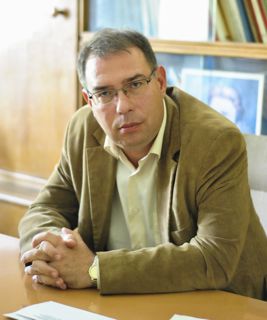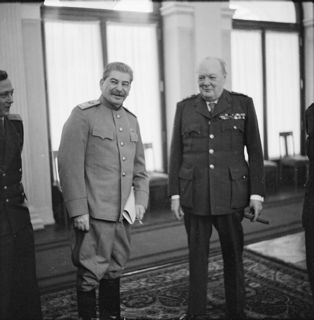This month marks the 70th anniversary of the Yalta Conference that took place from 4-11 February 1945 near Yalta in the Crimean peninsula. The heads of state of the United States, Britain and the Soviet Union met then to separate their spheres of influence in Europe and the world. GRReporter met with Associate Professor Michael Gruev on this occasion to learn a little more about these events and their consequences today. Associate Professor Michael Gruev is the head of the Department of "History of Bulgaria" in the Faculty of History at Sofia University "St. Kliment Ohridski" and teaches Modern Bulgarian History, over the years he has specialised in topics such as the totalitarian regime and society, and historical anthropology. Michael Gruev talks with Polina Spartyanova.
 Why do modern historians consider this Conference as an event with controversial results?
Why do modern historians consider this Conference as an event with controversial results?
The Yalta Conference ended with the declaration of united Europe, which was addressed more to the general public than to have any direct relation to the actual policy. However, it ended the process of division of Europe.
The results were controversial for the countries that remained in the Soviet zone of influence, and undoubtedly, the outcome was negative for those nations but I do not think that Yalta was the significant divide. For Bulgaria, it was a meeting between Churchill and Stalin in Moscow in October '44, for other countries at other times and therefore, Yalta had only completed a process of division that had started at the very course of the war. On the other hand, the wishes in this statement sound very beautiful – establishing democratic governments in all free countries, elections in the shortest possible time after the war to make legitimate this new power, restoring the rule of law. Those are all beautiful phrases that had little to do with real politics, as it was associated with a cruel division between the east and the west, and with the fall of east European nations under a no less fierce dictatorship. In this sense, regarding the peoples from this side of the Iron Curtain, Yalta could not help but be controversial.
What decisions on Bulgaria and Greece were made at the Conference?
 Yalta reconfirmed the division that was already happening. That is why I said that this division of spheres of influence, especially in the Balkans, had taken as early as October '44 when the two big players had agreed on the percentages of influence in these countries. When it was clear that Bulgaria remained in the Soviet sphere of influence with 75% and Greece in the British sphere of influence with 90%, the profound naiveté of Churchill himself and the British diplomacy became apparent. The mechanism and metrics that would measure these rates were not clear even at that time, as the percentages would become 100% where the Red Army had entered.
Yalta reconfirmed the division that was already happening. That is why I said that this division of spheres of influence, especially in the Balkans, had taken as early as October '44 when the two big players had agreed on the percentages of influence in these countries. When it was clear that Bulgaria remained in the Soviet sphere of influence with 75% and Greece in the British sphere of influence with 90%, the profound naiveté of Churchill himself and the British diplomacy became apparent. The mechanism and metrics that would measure these rates were not clear even at that time, as the percentages would become 100% where the Red Army had entered.
What were the consequences for the two countries after the Conference?
The Yalta Conference generally forced the authorities in Bulgaria to partially loosen belts and introduce multi-party politics with many contingencies, to legalise opposition parties and simulate  multi-party elections, which were a true simulation, because the opposition refused to take part in them in November '45, only the Fatherland Front ran in them. The opposition itself had no chance of a legal expression. But some parliamentarism, a multi-party systme, was imitated as a facade after the Yalta Conference and it continued for a very short time, until the Paris Peace Treaty in early 1947 after which the power in Bulgaria did not need this flirting and this game of opposition and parliamentarism. Therefore, its implication for Bulgaria in the context of this cycle for ending the war was very limited and very temporary.
multi-party elections, which were a true simulation, because the opposition refused to take part in them in November '45, only the Fatherland Front ran in them. The opposition itself had no chance of a legal expression. But some parliamentarism, a multi-party systme, was imitated as a facade after the Yalta Conference and it continued for a very short time, until the Paris Peace Treaty in early 1947 after which the power in Bulgaria did not need this flirting and this game of opposition and parliamentarism. Therefore, its implication for Bulgaria in the context of this cycle for ending the war was very limited and very temporary.
As for Greece, the Yalta Conference forced the interim government to run in the elections in the same way. It is another issue that the Communist Party, which was quite strong and influential at the time, refused to recognise these results. This was the called agreement in Varkiza and in fact, this refusal to recognise the Yalta arrangements resulted in a bloody civil war that began in '46 but continued until '49.
Since the "Big Three" had agreed on holding free democratic elections in all European  countries, why was their agreement not observed in Bulgaria and Greece?
countries, why was their agreement not observed in Bulgaria and Greece?
It was because Bulgaria was occupied by the Red Army that dictated the conditions of holding the elections. In fact, there were no conditions under which to conduct normal elections whereas Greece held such elections which showed a strong polarisation of Greek society and the strong influence of the Greek Communist Party, which had the halo, and was considered as the driver, of anti-German resistance. Yet it turned out that it was not strong enough to take power alone and that was the reason for it to abandon the arrangement and to proceed to a bloody civil conflict.
Was there a way at that time in which Bulgaria could outgrow the Soviet influence in the country?
We usually do not ever practise to reflect on the counter-current, on what would happen "if ...", we consider the events as they are. However, I do not see the possibility of another solution, as well as for other Eastern European countries in which the Red Army had entered, whether the Communist Party was strong enough to win the elections alone. For example, in Czechoslovakia and Hungary, it was too weak and could not win the elections regardless of the occupation regime in these areas. Yet the Red Army made an internal coup in these countries and placed the Communists on top of power without running into elections. Therefore, I do not see another alternative for Bulgaria.
Why did our country not seek the assistance of the other two great powers?
There were no conditions for doing so. Let us not forget that Bulgaria unilaterally declared war on them in December 1941, saying that this would be a symbolic war. Then, when the bombing began, the war was not so symbolic and they had no reason to sympathise with Bulgarians. Conversely, Churchill considered the allocation of the country to Stalin as a way to punish it for its treachery. He specifically had a sharp edge on Bulgarians. As for Americans, they were too far away. This was also evident at the Yalta Conference itself. Roosevelt was generally under the influence of Stalin’s charisma. Roosevelt and Churchill could hardly be regarded as teammates, Roosevelt was too prejudiced against Churchill and for him, he embodied the old British imperialism, the old politician who sustained the colonial system. In this sense, in purely political terms, Roosevelt was willing to give priority to Stalin than to Churchill. Therefore, what should be said about the policy of Roosevelt would be that even in the very course of the war he had become disinterested in the fate of Eastern Europe, leaving the Brits and Soviets to decide on it.
When Truman appeared, he tried to correct all this but it was too late. He realised that it would take to use force to deter communism and this was why the United States had ultimately assisted the Greek government in crushing the communist resistance there.
70 years after the Yalta Conference, could we talk about a new realignment of the influence of the Great Powers in the modern world for the time being?
Perhaps something similar is underway but it has not yet found its "Yalta". Russia is probably trying to change the status quo, and it remains to be seen where it will stop. Clearly, it will not be able to change the entire world order alone, but as for nearby regions, it will try to restore its influence. However, it can be said that over the past two years the Yalta order has been undermined, since Yalta boundaries and agreements have been perceived as the same thing, in purely territorial and geopolitical aspect. We have recently seen that the Yalta borders can be broken.
How do you perceive the monument of the three powerful players that was erected in honour of the Yalta Conference of Crimea peninsula, which is one of the disputed territories in Europe today?
This is totally normal, both for historical and advertising purposes. Each of the three has contributed to human history, although in a sinister way in some cases. Anyway, each one of them deserves to be remembered in one way or another.